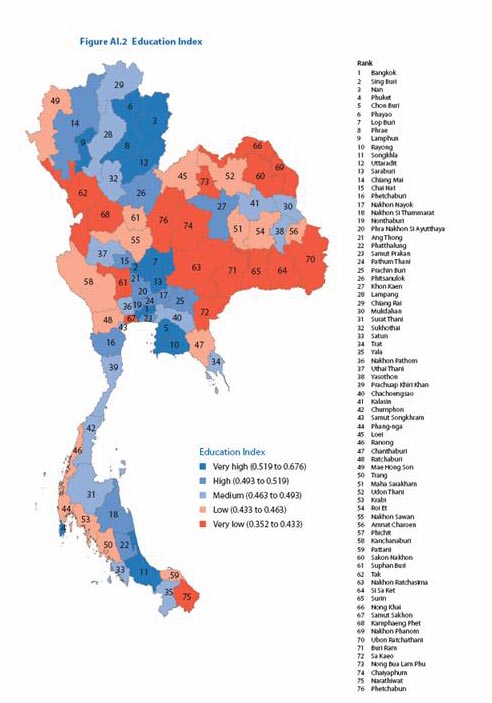In a modern and diversified economy, one of the key strategies for rural development should be the promotion of high quality education. Access to primary, secondary and tertiary education will provide rural youngsters with a sound basis for livelihood choice. The UNDP’s 2007 Human Development Report noted the significant advances Thailand has made in providing for universal education: “Thanks to the nine-year compulsory education law and other factors, more children enrol in school, and more stay longer. In 2005, people had an average of 8.5 years of schooling, an increase from 7.6 in 2002” (p. 7). But there are still significant inequalities in access to schooling. For example, “while almost all students from households in the top income quintile now complete nine years of education, only 80 percent in the bottom quintile do” (p. 7). The spatial dimensions of this inequality are starkly illustrated in the UNDP’s map of its “education index.”
So, what are the various parties contesting the upcoming election promising in relation to education? Here is an initial brief summary of the main education policies (I will add some more detail over the next day or so). As with my previous summary of rural development policies, I make no claims that this list is complete or perfectly accurate. As usual, readers’ contributions are very welcome.
Democrats
тАв Free education for all Thai children from pre-school to the end of high school.
Phalang Prachachon (PPP)
тАв Education funds (scholarships?) with repayments later.
Phua Phaendin
тАв Improve education standards.
Matchimathipatai
тАв Free education from pre-school to bachelor’s degree in government institutions.
тАв Provision of rotating funds to schools (50,000 to 150,000 baht).
тАв Establish education funds (scholarships?) for people with insuffient funds to cover education expenses.
тАв 1500 baht scholarships for certain categories of monks.
Chart Thai
тАв Free education and free lunch.
The policy information I have been able to access so far is rather short on detail. As in relation to rural development, Matchimathipatai seems to have the most detailed program. The various commitments to free education are all very well, but without significant investment in schools and teachers, access inequalties are unlikely to be addressed.
 Facebook
Facebook  Twitter
Twitter  Soundcloud
Soundcloud  Youtube
Youtube  Rss
Rss 